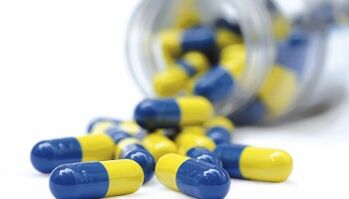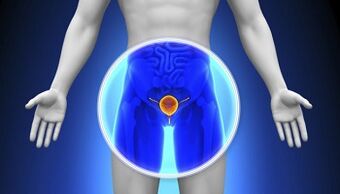
Prostatitis is an urological disease of an inflammatory or infectious nature, which affects the gland of the prostate and can lead not only to helplessness, but also to infertility.According to statistics, this disease occurs in 50% of men.It should also be noted that "younger" disease is quite often diagnosed in young people (up to 40 years).The treatment of acute and chronic prostatitis, a rather long process, but most often carried out by conservative measures - prostatitic tablets, physiotherapeutic procedures are used and an adjustment of lifestyle is carried out.
It should be noted that the operation with such a disease is not excluded - if drug treatment does not give the appropriate result or not at all in a specific clinical case is not effective.In all cases, the treatment program is only prescribed by the doctor individually.
Use indications
Important!Even the presence of characteristic symptoms is not a reason to take prostate tablets.The clinical picture can be the result of another urological or even veneological disease.In addition, symptoms can be a manifestation of prostate cancer, so taking certain drugs not only will not be effective, but also dangerous.Only a specialist must be prescribed in men from prostatitis in men after making a diagnosis.
The inflammation of the prostate gland at the initial stage has light symptoms.
The development of acute prostatitis may indicate such clinical signs:

- Painful sensations during intercourse or during urination.It should be noted that pain can be present even during an erection and at the end of sex;
- frequent, often accompanied by unpleasant sensations, urination;
- The pain is present in the pubic area, the groin, often gives the crotch and the sacrum;
- With an acute form of the disease, it is possible to increase body temperature;
- Weakening an erection, but a complete helplessness does not occur;
- There is pain during ejaculation;
- Premature ejaculation.
In the chronic form of prostatitis, the clinical picture is almost the same, but manifests itself in a wave.At the same time, the symptoms are not as pronounced as it occurs in acute form.It is such a latent evolution of the pathological process which often leads to a late diagnosis, when the disease is already impossible to cure.
To determine exactly which drugs for the treatment of prostatitis in men will be the most effective in each case, the doctor can only after having made a complete diagnosis.
If prostatitis is suspected, these laboratory and instrumental measures are carried out:
- blood fence for general and biochemical analysis;
- STD test;
- PCR tests;
- Urethful smear for bacteriological research;
- Prostate transrectal ultrasound study;
- Ultrasound of the Genito-Urinary System;
- CT or MRI of small pelvic organs.

The treatment of inflammation of the prostate gland in each case is individual.
Please note that this is only an approximate diagnostic program.The exact list of analyzes - laboratory and instrumental - The doctor determines individually, taking into account the results of a physical examination and the history collected.
Treatment
The basis of treatment, if there is no indication for the operation, is to take medication.It is impossible to answer the question "what pills are the most effective in prostatitis" because drugs are prescribed individually.Therefore, what has been effective for a patient can be useless for another.
Treatment of prostatitis with tablets involves taking drugs from the following action spectrum:
- antibiotics;
- non-steroidal anti-inflammatory drugs;
- analgesics;
- alpha-blockers;
- immunomodulators;
- Plants based on homeopathic plants or preparations.
The duration of taking medication, the intake and dosage scheme is also determined by the attending physician.
First, the doctor prescribes antibacterial therapy.
Antibiotics
To determine which antibiotics is suitable for the patient, the bacteriological sowing is previously carried out.In most cases, the treatment is carried out:
- tetracyclines;
- Penicillins;
- Fluoroquinols.
Antibiotics cannot be taken independently at their discretion, as drugs in this pharmacological group can extremely negatively affect the work of the body if they are badly taken.
Among the side effects, there are the following:
- allergic reactions;
- Complications of the functioning of the kidneys, the liver;
- noise in ears, dizziness, headache;
- dermatitis;
- drowsiness, lethargy;
- Nausea and vomiting.
If secondary symptoms are detected, you should stop taking the tablets and consult a doctor.
Doctors have noticed that pain and other symptoms of prostatitis calm up after taking antibiotics even in cases where the infectious nature of the disease has not been determined.
For the treatment of non -bacterial prostatitis, patients are prescribed antibacterial drugs.
Non-steroidal anti-inflammatory
The drugs in this group are essential in the treatment of prostatitis in all form, because inflammation is relieved, and at the same time unpleasant symptoms that this pathological process causes - pain, burn, feeling of heaviness in the inguinal region.
But they cannot be taken if there is a stomach ulcer, myasthenia.
Analgesic
In this case, the drug is used for symptomatic treatment.
The safe dosage is also determined by the attending physician.You should not abuse such drugs, because the body gets used to it quickly and does not give the right therapeutic effect.
Analgesics allow a man to live a full life.
Alpha-clockers
Medicines in this pharmacological group are used to improve the flow of urine, and they are used for almost all forms of prostatitis.
It should be noted that in most cases, these drugs are used for symptomatic treatment and not to eliminate the disease itself in the root.
In addition, plant -based homeopathic preparations are also used.They are used in cases where there is no need for antibiotics.
Of course, no one can ban drugs without a prescription from a doctor, because many of them are released in a pharmacy without a prescription.However, you must understand the following - taking a prescription without a doctor can be dangerous for health.Even if the symptoms disappear, the disease itself may not be eliminated.And this means that the risk of chronizing the pathological process and the development of concomitant complications increase.
During the first symptoms, you should consult a doctor and do not process at your discretion.The doctor will not only collect effective tablets, but will also prescribe physiotherapeutic procedures, will give recommendations of a general nature.Only such a complete approach to prostatitic treatment will give the desired therapeutic effect.
In addition, the prevention of these diseases must be carried out and periodically (once every six months) undergoes a preventive examination by a urologist or an Andrologist.























